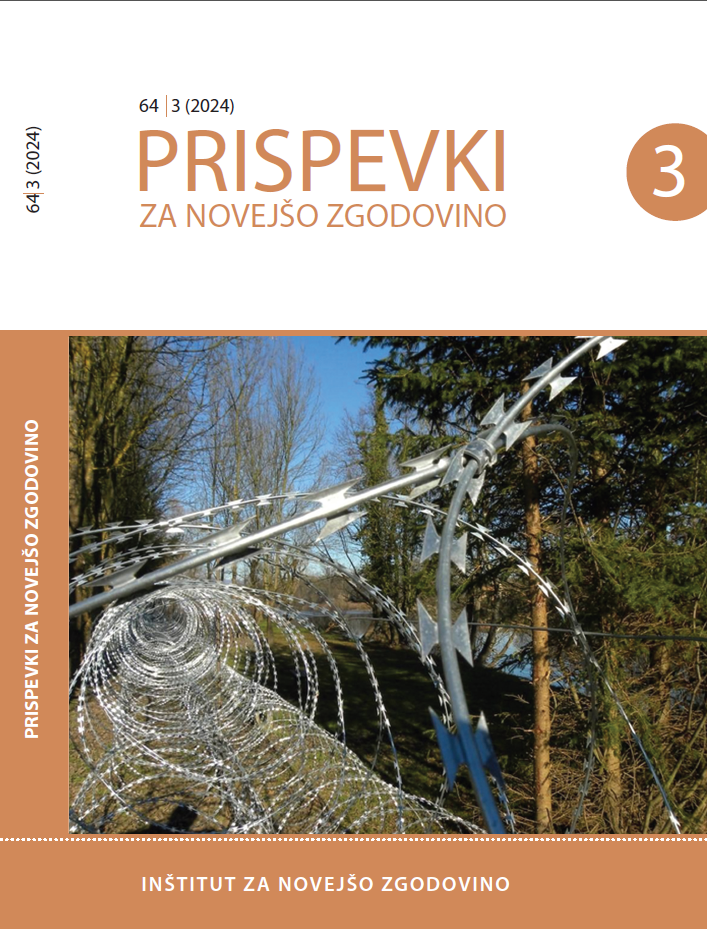The Propaganda Fund for Carinthia: The Intertwining of Border Making, Economy and Politics in the Post-Habsburg Borderland
DOI:
https://doi.org/10.51663/pnz.64.3.02Keywords:
Kingdom SCS, The Propaganda Fund for Carinthia, Mežica lead mine, Jadran bank, Yugoslav Democratic Party, Gregor ŽerjalAbstract
The establishment of the Kingdom of Serbs, Croats and Slovenes in 1918 opened up opportunities for a new economic policy characterised by the “nationalization” or “slovenization” of economic entities under “foreign” administration or owned by “foreigners”. The National Committee for Carinthia confiscated or "sequestered" a large amount of lead in Mežica and channelled the money from the sale to the Propaganda Fund for Carinthia. In 1922, representatives of the liberal Yugoslav Democratic Party were misusing money from the lead business, which triggered the affair. The article focuses on the intertwining of economy and politics by creating the northern border and the complex and long-term consequences of the “lead manipulation”.
References
Aleksić, Vesna. »Hungarian Financial Capital in the Kingdom of Yugoslavia.« V: Magyarország és a Balkán. Balkán füzetek, különszám. 2, ur. Zsuzsa M. Császár, 248–60. Pécs: Szerzok, 2009.
Balkovec, Bojan. Prva slovenska vlaga 1918–1921. Ljubljana: Znanstveno in publicistično središče, 1992.
Eloranta, Jari, Stefan Nikolić in Flóra Macher. »Between disintegration and convergence, 1918–1939.« V: The economic history of Central, East and South-East Europe: 1800 to the present, ur. Mathias Morys, 216–42. London: Routledge, 2020.
Friš, Darko, Janez Osojnik in Gorazd Bajc. »Koroška v odločilnem letu 1920: delovanje plebiscitne komisije.« Acta Histriae 26, št. 3 (2018): 923–44. DOI: 10.19233/AH.2018.38.
Kresal, France. Vloga tujega kapitala v Sloveniji pred drugo svetovno vojno. V: Pogled v zgodovino slovenskega podjetništva, ur. Tone Krašovec, 85–102. Vrhnika: Razum, 1998.
Kresal, France. Zgodovina socialne in gospodarske politike v Sloveniji od liberalizma do druge svetovne vojne, ur. Neven Borak in Žarko Lazarević. Ljubljana: Cankarjeva založba, 1998.
Lazarević, Žarko in Jože Prinčič. Zgodovina slovenskega bančništva. Ljubljana: Združenje bank Slovenije, 2000.
Lazarević, Žarko. »Gospodarsko sodelovanje Slovenije in Avstrije med obema vojnama.« V: Slovensko-avstrijski odnosi v 20. stoletju. Slowenishc-österreichische Beziehungen im 20. Jahrhunder, ur. Dušan Nećak. Ljubljana: Oddelek za zgodovino Filozofske fakultete, 2004.
Lazarević, Žarko. »Slovenski nacionalni interes v gospodarstvu do druge svetovne vojne.« Zgodovinski časopis 59, št. 1-2 (2005): 101–10.
Marcus, Nathan, Stefan Nikolić in Tobias Straumann. »Economic policy, 1918–1939.« V: The economic history of Central, East and South-East Europe: 1800 to the present, ur. Mathias Morys, 188–215. London: Routledge, 2020.
Marn, Rudolf. »Nacionalizacija in sekvestracija tujih podjetij.« V: Spominski zbornik Slovenije. Ob dvajsetletnici Kraljevine Jugoslavije, ur. Jože Lavrič, Josip Mal in France Stele, 368–69. Ljubljana: Založba »Jubilej«, 1939.
Mohorič, Ivan. Industrializacija Mežiške doline, Maribor: Založba Obzorja, 1954.
Morys, Mathias. »Economic growth and structural change in Central, East and South-East Europe.« V: The economic history of Central, East and South-East Europe: 1800 to the present, ur. Mathias Morys, 161–87. London: Routledge, 2020.
Pahor, Milan. Jadranska banka v Trstu. Trst: Narodna in študijska knjižnica; Slovenski raziskovalni inštitut, 1996.
Perovšek, Jurij. »Organizacijsko-politična slika liberalnega tabora v letih 1891–1941.« Prispevki za novejšo zgodovino 57, št. 1 (2017): 49–83.
Perovšek, Jurij. Afera Jadranska banka. V: Slovenska kronika XX. Stoletja, ur. Marjan Drnovšek in Drago Bajt, 272. Ljubljana: Nova revija, 1995.
Perovšek, Jurij. Slovenski prevrat 1918. Položaj Slovencev v Državi Srbov, Hrvatov in Slovencev. Ljubljana: Inštitut za novejšo zgodovino, 2018.
Ribnikar, Peter. Sejni zapisniki narodne vlade Slovencev, Hrvatov in Srbov v Ljubljani in Deželnih vlad za Slovenijo 1918–1921. 3. del od 22. mar. 1920 do 9. jul. 1921. Ljubljana: Arhiv Republike Slovenije, 2002.
Šorn, Jože. Slovensko gospodarstvo v poprevratnih letih 1919–1924, ur. Neven Borak in Žarko Lazarević. Ljubljana: Cankarjeva založba, 1997.
Stiplovšek, Miroslav. Razmah strokovnega sindikalnega gibanja na Slovenskem. Pregled razvoja in delovanja strokovnih organizacij v jugoslovanskem delu Slovenije od prevrata 1918 do ponovne utrditve revolucionarnih strokovnih organizacij konec 1922. Ljubljana: Partizanska knjiga in Delavska enotnost, 1979.
Troha, Nevenka. »Koroški plebiscit.« V: Slovenska novejša zgodovina, ur. Jasna Fisher, 221. Ljubljana: Mladinska knjiga in Inštitut za novejšo zgodovino, 2006.
Wolf, Nikolaus, Max-Stephan Schulze in Hans-Christian Heinemeyer. »On the Economic Consequences of the Peace: Trade and Borders After Versailles.« The Journal of Economic History 71, št. 4 (2011): 915–49. https://doi.org/10.1017/S0022050711002191.
Downloads
Published
Issue
Section
License
Copyright (c) 2024 Nataša Henig Miščič

This work is licensed under a Creative Commons Attribution 4.0 International License.
Authors who publish with this journal agree to the following terms:
- Authors retain copyright and grant the journal right of first publication with the work simultaneously licensed under a Creative Commons Attribution License that allows others to share the work with an acknowledgement of the work's authorship and initial publication in this journal.
- Authors are able to enter into separate, additional contractual arrangements for the non-exclusive distribution of the journal's published version of the work (e.g., post it to an institutional repository or publish it in a book), with an acknowledgement of its initial publication in this journal.
- Authors are permitted and encouraged to post their work online (e.g., in institutional repositories or on their website) prior to and during the submission process, as it can lead to productive exchanges, as well as earlier and greater citation of published work (See The Effect of Open Access).


